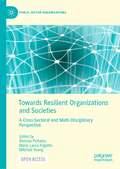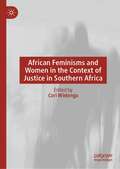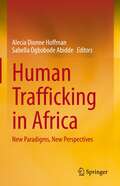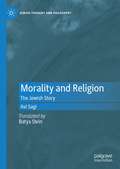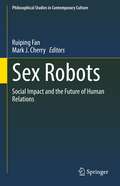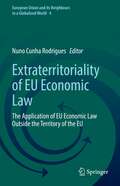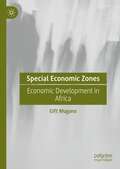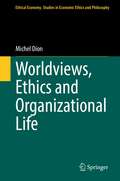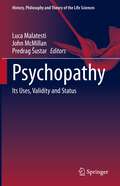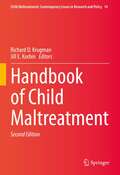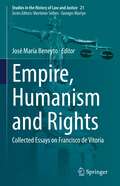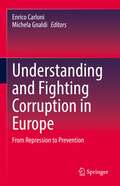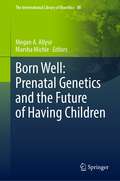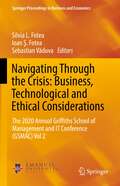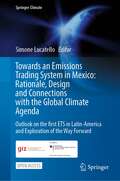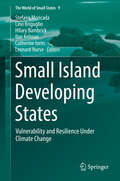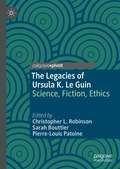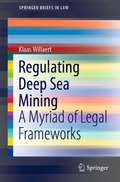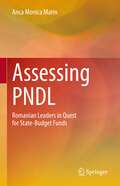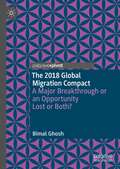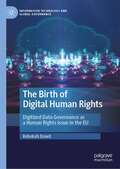- Table View
- List View
Towards Resilient Organizations and Societies: A Cross-Sectoral and Multi-Disciplinary Perspective (Public Sector Organizations)
by Rómulo Pinheiro Maria Laura Frigotto Mitchell YoungThis open access book brings together scholars in the fields of management, public policy, regional studies, and organization theory around the concept of resilience. The aim is to provide a more holistic understanding of the complex phenomenon of resilience from a multi-sectorial, cross-national, and multidisciplinary perspective. The book facilitates a conversation across diverse disciplinary specializations and empirical domains. The authors contribute both to theory testing and theory development and provide key empirical insights useful for societies, organizations, and individuals experiencing disruptive pressures, not least in the context of a post-COVID-19 world. Diverse chapters are held together by a clear organization of the volume across levels of analysis (resilience in organizations and societies) and by an original perspective on resilience derived from an extended review, by the editors, of the existing literature and knowledge gaps, according to which each of the individual chapter contributions is positioned and connected to.
Nurses and COVID-19: Ethical Considerations in Pandemic Care
by Connie M. Ulrich Christine GradyThis book addresses the many ethical issues and extraordinary risks that nurses and others are facing during the COVID-19 pandemic, which creates physical, emotional, and economic burdens, affecting nurses' overall health and well-being. Nurses are essential front-line clinicians across all health care settings and in every nation. The COVID-19 pandemic caused by the novel SARs-CoV-2 virus has affected children, adults, and communities within and across all societies. Nurses, too, have contracted the virus and died from the disease. They have also seen their colleagues, family members, and friends hospitalized or in intensive care units struggling to survive. Nursing’s professionalism and disciplinary resolve to care for patients and families amidst confusion, misinformation, and shifting guidelines has been called “heroic” by the public. How much risk should nurses be expected to accept during a pandemic? How do nurses help patients and families find comfort and dignity at the end-of-life? How do we help nurses who are suffering from moral distress and mental health concerns from what they have seen, been asked to do, or are unable to provide? And, how does society move forward from a pandemic that has challenged our basic ethical principles of justice and what is “fair, good and right” in caring for those who need care, including the most vulnerable and nurses themselves? This book addresses these and other ethical concerns that nurses are facing in their day-to-day clinical practice; experiences shared with patients, families, and colleagues. Although this book was written while the pandemic was still raging across the United States and globally, the events needed to be told as they were unfolding. This book helps us to learn from both the successes and failures that are affecting so many across the globe, including those on whom the public relies on to provide quality, compassionate, and expert care when they are sick: nurses.
African Feminisms and Women in the Context of Justice in Southern Africa
by Cori WielengaThis book explores justice ‘on the ground’ in Southern African communities, and in particular the roles that women play in these processes. Justice on the ground is often critiqued for being male-dominated and patriarchal. This volume seeks to unpack and problematize this assumption through the case studies of Namibia, Zimbabwe, Mozambique and South Africa. Contributions focus on the lived experiences of women and the intersections of race, class, culture and the colonial experience that shape their lives. In the rural and peri-urban contexts discussed in this book, justice on the ground is found to be relational. The network of relationships between people and the well-being and health of a community as an integral whole continue to be of central importance as the survival of the community depends on the entire community functioning interdependently. An engagement with African feminisms is helpful in providing a number of lenses, or simply questions, through which to read the case studies. These case studies reveal the complex and organic ways in which women have power and influence in relation to justice on the ground which may not be immediately obvious.
Human Trafficking in Africa: New Paradigms, New Perspectives
by Sabella Ogbobode Abidde Alecia Dionne HoffmanThis edited volume examines the contemporary practice of human trafficking on the African continent. It investigates the scourge of human trafficking in Africa from the broader international and regional perspectives as well as from a country-specific context. Written by a multi-disciplinary panel of academics and practitioners, the book is divided into three sections that highlight a wide range of issues. Section One examines the theoretical and legal challenges of trafficking. Section Two focuses on the regional and nation-state perspectives of human trafficking along with selected cases of trafficking. Section Three highlights the impact of trafficking on youth, with specific attention given to child soldiering and female victims of trafficking. Providing a multi-faceted approach to a problem that crosses multiple disciplines, this volume will be useful to scholars and students interested in African politics, African studies, migration, human rights, sociology, law, and economics as well as members of the diplomatic corps, governmental, intergovernmental, and non-governmental organizations.
Morality and Religion: The Jewish Story (Jewish Thought and Philosophy)
by Avi SagiThe relationship between morality and religion has long been controversial, familiar in its formulation as Euthyphro’s dilemma: Is an act right because God commanded it or did God command it because it is right. In Morality and Religion: The Jewish Story, renowned scholar Avi Sagi marshals the breadth of philosophical and hermeneutical tools to examine this relationship in Judaism from two perspectives. The first considers whether Judaism adopted a thesis widespread in other monotheistic religions known as 'divine command morality,' making morality contingent on God’s command. The second deals with the ways Jewish tradition grapples with conflicts between religious and moral obligations. After examining a broad spectrum of Jewish sources—including Talmudic literature, Halakhah, Aggadah, Jewish philosophy, and liturgy—Sagi concludes that mainstream Jewish tradition consistently refrains from attempts to endorse divine command morality or resolve conflicts by invoking a divine command. Rather, the central strand in Judaism perceives God and humans as inhabiting the same moral community and bound by the same moral obligations. When conflicts emerge between moral and religious instructions, Jewish tradition interprets religious norms so that they ultimately pass the moral test. This mainstream voice is anchored in the meaning of Jewish law, which is founded on human autonomy and rationality, and in the relationship with God that is assumed in this tradition.
Sex Robots: Social Impact and the Future of Human Relations (Philosophical Studies in Contemporary Culture #28)
by Ruiping Fan Mark J. CherryThis book provides cross-cultural ethical exploration of sex robots and their social impact. What are the implications of sex robots and related technological innovations for society and culture? How should we evaluate the significance of sexual relations with robots that look like women, men or children? Critics argue that sex robots present a clear risk to real persons and a social degradation that will increase sexual violence, objectify women, encourage pedophilia, reinforce negative body images, increase forms of sexual dysfunction, and pass on sexually transmitted disease. Proponents judge robotic sexual companionship as just another step in the exploration of human desire. They see sex robots, and similar technology, such as virtual reality pornography, as providing autonomy affirming companionship for the lonely and a relatively harmless outlet for sexual fantasies that avoids the use of human prostitutes and thus reduces sexual victimization. Some appreciate sex robots as a social evil, others as a positive good, and still others as a harmless pastime. How we come to terms with such conceptual and moral concerns will have significant implications for society and the future of human relations. This book is of great interest to researchers in bioethics, human sexual behavior, AI ethics, and philosophy of sex.
Extraterritoriality of EU Economic Law: The Application of EU Economic Law Outside the Territory of the EU (European Union and its Neighbours in a Globalized World #4)
by Nuno Cunha RodriguesThis book sheds new light on the potential application of EU law to situations arising outside EU territory, and its consequences. In today’s globalized world, EU law and the ECJ’s decisions have been calling for exceptions and defining new connecting elements that make the traditional approach of EU law, based on the territoriality principle, less straightforward. This is the case with e.g. the effects doctrine in the context of EU competition law, as was fully recognized after the ECJ’s Intel case. Moreover, recently approved rules concerning the EU’s internal market, EU environmental law and EU data protection law have made it more difficult to define the application of EU law in terms of a pure link to the territoriality principle. The book examines these and other problems from the perspectives of various branches of EU economic law. With regard to EU competition law it presents, among others, studies on the evolution of the effects doctrine in the US and the EU; extraterritoriality of competition law; global cartels; merger control; state aid and cooperation between NCAs. Furthermore, it includes several studies concerning extraterritorial issues in trade relations between the EU and China; EU screening regulation of foreign direct investments; EU trade agreements; EU investment law and EU financial services. The twenty-one contributing authors are internationally respected experts on EU law.
Special Economic Zones: Economic Development in Africa
by Gift MuganoThis book provides a guide to the challenges of special economic zones. Focusing on Africa, while also discussing China, Taiwan, Dominican Republic, Malaysia, and South Korea, the impact on economic development of special economic zones is analysed to highlight the successes and failures of these zones. New emerging issues, such as the sustainable development goals and the fourth industrial revolution, are presented as factors that need to be addressed in order for special economic zones to be productive in Africa. The role of foreign direct investments, job creation, industrialization, and regulation is also discussed.Special Economic Zones: Economic Development in Africa aims to set out an empirical framework on how to create effective special economic zones. It will be relevant to researchers and policymakers interested in African and development economics.
Worldviews, Ethics and Organizational Life (Ethical Economy #60)
by Michel DionThis book provides an innovative way to revisit the depth and scope of our moral/post-moral worldviews, while undertaking an ontic reflection about organizational life. The ontic dimension of life refers to existing entities’ lived experiences. It has nothing to do with psychological and relational processes. The ontic level of analysis mirrors a philosophical outlook on organizational life. Unlike moral worldviews, post-moral worldviews oppose the existence of Truth-itself. Post-moral worldviews rather imply that dialogical relationships allow people to express their own truth-claims and welcome others’ truth-claims. The purpose of this book is to explain the philosophical implications of moral and post-moral worldviews and the way to move from a moral to a post-moral worldview. Moreover, this book explores the possibility to transcend the moral/post-moral dualism, through moral deliberation processes and a reinterpretation of the Presence of the Infinite in all dimensions of human life. This book could eventually help to better grasp the basic philosophical challenges behind ethical reflection about organizational issues.
Green Criminology and the Law (Palgrave Studies in Green Criminology)
by Richard Jochelson James GacekThis edited collection is grounded in a green criminological approach to understand whether the law, both in effect and implications, reflects, refracts, or sublimates the social, political and ecological conditions of our times. Since its initial proposal in the 1990s, green criminology has focused the criminological gaze on a wide array of harms and crimes affecting humans, animals other than humans, ecological systems, and the planet as a whole. As a continuously blossoming field of criminological inquiry, green criminology recognizes and examines behaviours that are both illegal and legal (yet detrimental), and in varying ways has made great efforts to provide insight into harms in a more fulsome manner. At the same time, there have been many significant legal instances, domestic, and international, including case law, legislation, regulation, treaties, agreements and executive directives which have troubled the law’s understanding of green harms, illegal and legal activity, pushing legal boundaries in the process. Recognizing that humanity and nature are inextricably integrated, Green Criminology and the Law reflects the range and depth of high-quality research and scholarship, combining contributions from established scholars willing to explore new topics and recent entrants who are breaking new scholarly ground.
Psychopathy: Its Uses, Validity and Status (History, Philosophy and Theory of the Life Sciences #27)
by John McMillan Luca Malatesti Predrag ŠustarThis book explains the ethical and conceptual tensions in the use of psychopathy in different countries, including America, Canada, the UK, Croatia, Australia, and New Zealand. It offers an extensive critical analysis of how psychopathy functions within institutional and social contexts. Inside, readers will find innovative interdisciplinary analysis, written by leading international experts. The chapters explore how different countries have used this diagnosis. A central concern is whether psychopathy is a mental disorder, and this has a bearing upon whether it should be used. The book’s case studies will help readers understand the problems associated with psychopathy. Academics and students working in the philosophy of psychiatry, bioethics, and moral psychology will find it a valuable resource. In addition, it will also appeal to mental health professionals working in forensic settings, psychologists with an interest in the ethical implications of the use of psychopathy as a construct and particularly those with a research interest in it.
Handbook of Child Maltreatment (Child Maltreatment #14)
by Richard D. Krugman Jill E. KorbinThe second edition of this successful handbook, edited by well-known experts in this field, includes core questions in the field of child abuse and neglect. It addresses major challenges in child maltreatment work, starting with “What is child abuse and neglect?” and then examines why maltreatment occurs and what are its consequences. The handbook also addresses prevention, intervention, investigation, treatment as well as civil and criminal legal perspectives. It comprehensively studies the issue from the perspective of a broader, international and cross-cultural human experience. Apart from a thorough revision of existing chapters, this edition includes many new chapters covering recent developments in this area and other issues not covered in the first edition. There is more focus on substance abuse, psychological abuse, and on social and community involvement and public health provisions in the prevention of child maltreatment. The handbook examines what is known now and more importantly what remains to be researched in the coming decades to help abused and neglected children, their families and their communities, thereby taking the field forward.
Empire, Humanism and Rights: Collected Essays on Francisco de Vitoria (Studies in the History of Law and Justice #21)
by José María BeneytoThis book deals with Vitoria, Charles V and Erasmus. Vitoria’s ideas had a major influence on Charles V and his European and American policy. In turn, Erasmus’ humanism was decisive in the formation of a new international order intellectually discussed by Vitoria and put into practice by the Emperor.Shedding new light on the influence of Francisco de Vitoria and Erasmus on Charles V’s imperial policy, the book’s goal is to explore the impact of Vitoria’s thought with regard to the history of, and contemporary issues in, international law, while also comparing his thinking with that of the well-known humanist Erasmus and assessing their respective influences on the imperial policy of Charles V.
Understanding and Fighting Corruption in Europe: From Repression to Prevention
by Michela Gnaldi Enrico CarloniThe volume includes comparative and comprehensive discussions on anti-corruption policies of governments and anti-corruption agencies across Europe. Compared to existing literature that focuses either on general and theoretical aspects related to corruption or on country-specific experiences, this volume provides an interdisciplinary and broad overview of corruption prevention policies and measures undertaken by major European member states, relying both on literature and on institutional documentation of national anti-corruption agencies, which greatly contribute to shaping anti-corruption policy directions. In so doing, it advances the existing theoretical agenda of corruption studies and policies, situating it within wider disciplinary fields. This volume is especially concerned with the interrelationship between good administration, integrity, ethical behaviour and corruption; the role of transparency and digitalisation in preventing corruption and ensuring rights, efficiency and impartiality in the public administration; the measurement of corruption, with specific reference to preventative measures and indicators of administrative anti-corruption efforts; big data, block chains, and artificial intelligence; public management codes of ethics, performance targets and skills, and their role in tackling and preventing corruption; and public procurement, transparency and anti-bribery measures in the European public procurement system. This volume is of interest to graduate students and researchers in political sociology, political science, European corruption law, international relations, public policy, and social statistics.
Born Well: Prenatal Genetics and the Future of Having Children (The International Library of Bioethics #88)
by Megan A. Allyse Marsha MichieThis book brings together an international collection of experts in reproductive ethics, law, disability studies, and medicine to explore the challenging future of reproduction and children. From the medical to the social and from the financial to the legal, the authors explore the expanding impact of reproductive genetics on our society. New advances in genetic technologies are revolutionizing the practice of reproductive medicine. We have expanded our ability to detect genetic changes in embryos and fetuses in ways that potentially allow to identify, treat, or prevent a growing range of diseases. The development of gene-editing technologies raises questions about the possibility of removing disease-causing variants from embryos before pregnancy implantation. The growing sophistication of prenatal genomic sequencing offers us glimpses into the whole genome of the developing fetus. And, the increasingly sophisticated science of 'gene matching' allows us greater and greater foreknowledge of how the genomes of two individuals will combine in a future child. This is an indispensable book on the newest developments in bioethics caused by the sciences.Chapter 5 is available open access under a Creative Commons Attribution 4.0 International License via link.springer.com.
Rape in Early Modern England: Law, History and Criticism
by Helen BarkerThis book is intended for those in the humanities seeking a legal context for writing about rape in early modern England. It takes the premise that over the past four decades misunderstandings about rape law, and misreadings of rape statutes from medieval to Elizabethan times, have become widely cited in criticism. Helen Barker identifies how this has arisen, and discusses the main sources of confusion – including indissoluble issues around the word ‘ravishment’. Rape law historically encompassed elopement and abduction; this book offers a succinct overview of the law, and draws attention to the wider social context other than gender opposition in which it is often presented. In addition, critics have been tempted to rely on the ostensibly authoritative seventeenth-century treatise, The Lawes Resolutions of Womens Rights, as a legal source. By examining the context of its publication, this book suggests that the treatise is unreliable and can mislead the unwary.
Insurance and Human Rights (AIDA Europe Research Series on Insurance Law and Regulation #5)
by Birgit Kuschke Margarida Lima RegoThis volume examines the impact of and interplay between human rights and insurance. National, supranational and international legal instruments regulating the taking-up and pursuit of the business of insurance and reinsurance, (re)insurance distribution and the insurance contract often refer to or impact on human or fundamental rights. Courts are often faced with the sometimes seemingly impossible task of reconciling insurance core principles, practices and mind-sets with the principles and values stemming from human rights protection. In some cases, such as that of discrimination in insurance, this discussion has been going on for decades. Some deal with hot topics which have more recently emerged in light of developments stemming from technologic innovations (‘InsurTech’). The first part of the book focuses on insurance and the right to equal treatment. Discrimination on the basis of factors such as gender or age is tackled, from the perspectives of the European Union, Canada and South Africa. The second part of the book highlights the very relevant role played by insurance in the upholding of the right to health, covering the United States of America, Africa and Brazil. The third part of the book explores InsurTech's manifold challenges upon the right to privacy, focusing on European Union. The fourth part tackles the threat posed by insurance on the right to life in general, but with a particular focus on the United Kingdom. Written by legal scholars and practitioners, the book offers international, comparative and regional or national perspectives, aiming to contribute to a more thorough and systematic understanding of the interactions between these two very different fields of law, providing the industry as well as the scientific community with insights from both sides of this seemingly difficult to transpose divide.
Navigating Through the Crisis: The 2020 Annual Griffiths School of Management and IT Conference (GSMAC) Vol 2 (Springer Proceedings in Business and Economics)
by Sebastian Văduva Ioan Ş. Fotea Silvia L. FoteaThis proceedings volume provides a multifaceted perspective on the unprecedented crises generated by the global COVID-19 pandemic, and its ramifications for individuals, businesses, organizations, governments and systems in developing countries. Featuring selected papers from the 2020 Annual Griffiths School of Management and IT Conference (GSMAC), held in Oradea, Romania, this volume focuses on business, technological and ethical considerations in the process of navigating through a global crisis. It analyzes the effectiveness of different measures taken at individual, organizational and country level and outlines potential scenarios and solutions for the new post-crisis reality. Finally, the book provides diagnosis and recommendations for managerial practice in various industries impacted.
Towards an Emissions Trading System in Mexico: Outlook on the first ETS in Latin-America and Exploration of the Way Forward (Springer Climate)
by Simone LucatelloThis Open Access book provides detailed information about the incoming Mexican Emissions Trading System, including an analysis on why the system was implemented, how the system was designed, how it operates, how it could work, and how it could be strengthened by 2023 when it will be formally launched. This document is aimed at those who want to understand how an ETS can operate in an emerging economy. Although it has been written for experts and non-experts, this book does not provide the underlying theory of market-based instruments and emissions trading systems in general. The book can be read from start to finish, but can also be used as a reference for specific components of regional ETSs. The book draws upon a meticulous study of background documents and fieldwork from different authors to tell the story of how a Mexican ETS, the first of its kind in Latin America, can be set in the country. The emissions trading system cover many greenhouse gas emissions and has been hailed as one of the cornerstones of the Mexican climate policy. The book also examines and explains how the ETS is designed and implemented.
Small Island Developing States: Vulnerability and Resilience Under Climate Change (The World of Small States #9)
by Ilan Kelman Lino Briguglio Stefano Moncada Hilary Bambrick Catherine Iorns Leonard NurseThis book explores how vulnerable and resilient communities from SIDS are affected by climate change; proposes and, where possible, evaluates adaptation activities; identifies factors capable of enhancing or inhibiting SIDS people’s long-term ability to deal with climate change; and critiques the discourses, vocabularies, and constructions around SIDS dealing with climate change. The contributions, written by well-established scholars, as well as emerging authors and practitioners, in the field, include conceptual papers, coherent methodological approaches, and case studies from the communities based in the Caribbean Sea and the Indian, Atlantic, and Pacific Oceans. In their introduction, the editors contextualise the book within the current literature. They emphasise the importance of stronger links between climate change science and policy in SIDS, both to increase effectiveness of policy and also boost scholarly enquiry in the context of whose communities are often excluded by mainstream research. This book is timely and appropriate, given the recent commission by the Intergovernmental Panel on Climate Change (IPCC) of a Special Report that aims at addressing vulnerabilities, “especially in islands and coastal areas, as well as the adaptation and policy development opportunities” following the Paris Agreement. Coupled with this, there is also the need to support the policy community with further scientific evidence on climate change–related issues in SIDS, accompanying the first years of implementation of the United Nations Sustainable Development Goals.
The Legacies of Ursula K. Le Guin: Science, Fiction, Ethics (Palgrave Studies in Science and Popular Culture)
by Christopher L. Robinson Sarah Bouttier Pierre-Louis PatoineThe Legacies of Ursula K. Le Guin explores how Le Guin’s fiction and essays have built a speculative ethical practice engaging indigenous knowledge and feminism, while crafting utopias in which human and other-than-human life forms enter into new relations. Her work also delineates new ways of making sense of the “science” of science fiction. The authors of this collection provide up-to-date discussions of well-known works as well as more experimental writings. Written in an accessible style, Legacies will appeal to any readers interested in literature, science fiction and fantasy, as well as specialists of science and technology studies, philosophy of science, ethics, gender studies, indigenous studies and posthumanism.
Regulating Deep Sea Mining: A Myriad of Legal Frameworks (SpringerBriefs in Law)
by Klaas WillaertThis book provides a comprehensive analysis and explanation of the legal regime with regard to deep sea mining. The wide array of activities which we refer to as deep sea mining are not governed by one universal framework. On the contrary, numerous legal instruments play a role, and it is important to maintain a clear overview. The United Nations Convention on the Law of the Sea (UNCLOS) sets out the overarching regime, but important distinctions must be made. For example, deep sea mining in the Area is subject to international regulations adopted by the International Seabed Authority (ISA), while similar activities on the continental shelf fall under national jurisdiction and are governed by domestic legislation of the coastal state. This dichotomy must be nuanced, however, taking into account that non-state actors conducting deep sea mining operations in the Area must also adhere to national laws of the sponsoring state, while mineral exploration and exploitation on the continental shelf are likewise subject to a number of international rules and principles. Moreover, separate exploration regulations were adopted by the ISA for distinct categories of mineral resources, and national legislation on deep sea mining is quite diverse. This book clearly identifies all relevant legal instruments, assesses their role, explains their interactions, and engages with some of the topical issues that surround them.
Assessing PNDL: Romanian Leaders in Quest for State-Budget Funds
by Anca Monica MarinThis book provides an in-depth analysis of the distribution of funds by the National Program for Local Development (PNDL), Romania’s largest state funded budget program. It provides an objective assessment of the way state budget funds are allocated at the level of county councils and municipalities in urban and rural areas. It covers allocations of the second phase of program implementation, namely the reformed PNDL II 2017-2020, which has double the volume of funds than the previous phase. Using a conceptual framework at the crossroads of sociology, public management, and public finance, this book provides necessary context for the complex funding environment of first and second tier level institutions in Romania.A comprehensive study on public administration, politicization, and development imbalances, this book will be of interest to researchers in public administration, sociology, and public finance, as well as politicians, civil servants, consultants, decision-makers, and representatives of responsible institutions with EU funds at national and EU level.
The 2018 Global Migration Compact: A Major Breakthrough or an Opportunity Lost or Both?
by Bimal GhoshThis book analyses the 2018 Global Compact on Migration and the need for, and difficulties of adopting a multilateral agreement on migration. Particular attention is given to the challenges and constraints involved, given not only the divergent needs and conditions of different counties but also the varying interests of different groups within countries. A synoptic history of previous attempts at reaching a multilateral migration agreement is provided, from 1927 onwards, to give context to the recent negotiations. The lack of a clear recognition of migration as a global process and the absence of a firm commitment to responsibility- sharing arrangements are highlighted. The book explains why the 2018 migration is both a breakthrough and at the same time an opportunity lost. In doing so,] it also analyses the limitations of the present deal, including inadequate attention to the root causes of forced and disruptive migration in origin countries, and highlights how the 2018 agreement can be built upon to create a dynamic harmony in the global migration system. The book will be relevant to researchers and policy makers as well as to professionals and activists concerned with migration, labour economics and international development.
The Birth of Digital Human Rights: Digitized Data Governance as a Human Rights Issue in the EU (Information Technology and Global Governance)
by Rebekah DowdThis book considers contested responsibilities between the public and private sectors over the use of online data, detailing exactly how digital human rights evolved in specific European states and gradually became a part of the European Union framework of legal protections. The author uniquely examines why and how European lawmakers linked digital data protection to fundamental human rights, something heretofore not explained in other works on general data governance and data privacy. In particular, this work examines the utilization of national and European Union institutional arrangements as a location for activism by legal and academic consultants and by first-mover states who legislated digital human rights beginning in the 1970s. By tracing the way that EU Member States and non-state actors utilized the structure of EU bodies to create the new norm of digital human rights, readers will learn about the process of expanding the scope of human rights protections within multiple dimensions of European political space. The project will be informative to scholar, student, and layperson, as it examines a new and evolving area of technology governance – the human rights of digital data use by the public and private sectors.
